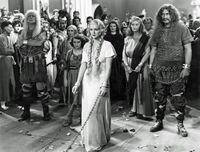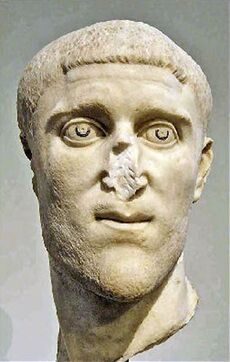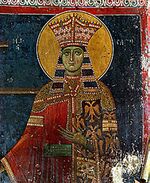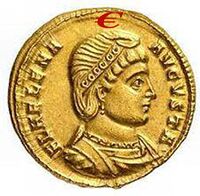Constantius I
“I'm feeling a little bit off-colour today. Let's not kill so many people today.”
“Never marry a saint if you want an active sex life”
One can imagine that Constantius I (250-306) must have been one of those people you would blink and miss them. He was called 'the colourless' (Chlorus in Latin) which suggests either he was so undistinguished that no one could recall him without applying that nickname or came from a country where the sun doesn't shine (i.e. Britannia). A natural deputy, someone without any personality to challenge the boss. If so it was an apt moniker. Constantius happily churned away for many years as a 'Caesar' (i.e. Deputy Emperor) before finally getting one year at the top job before dying in York after fighting the Picts.
Yet this 'pale rider' notched up two marriages, a number of sons and was the father of Constantine the Great. His first wife Helena would later become the first known Christian tourist and claimed to have found the burial chamber of Jesus in Jerusalem. For that she got a sainthood and an island named after her in the South Atlantic where later another emperor Napoleon would die in self-pitying exile. So though Constantius remains an obscure historical footnote', his son and first wife would achieve a greater immortality in future centuries.
Origins[edit]
That old historical standby - 'humble origins' (i.e. we have no data even to speculate here but we think this guy was a shit-wallowing peasant) - applies to Constantius. His son would later claim his father was related by marriage to emperor Claudius II and came from a family of military bores in Dardania, in what is now Serbia. If so then he came from the same neck of the woods that would see the emergence of emperor Diocletian. Since Constantine was born there too, it seems Constantius had plenty of family connections.
Joining the Roman army in about 270, Constantius was to spend most of his career - and indeed life - sitting in a saddle whilst out campaigning. You may think that sounds cushy but in that era no one used stirrups! I know, you have seen countless epic films with people riding around with the feet stuck in stirrups but that is all a lie. Perhaps because of a technological conspiracy or a patent issue, the strirrup only arrived in Europe in the 6th century. You stayed on your horse by squeezing your legs together. Perhaps that was why Constantius was always so drained of colour, spending hours keeping his clenched buttocks glued firmly to a saddle.
Helena[edit]
Constantius met his first wife Helena in a frontier tavern somewhere along the Roman frontier. She was the daughter of a publican and alleged to be British because she had a huge capacity at drinking. Helena also appears to have doubled up as security and would wade in to sort out fights, besting many a boozy soldier who tried it on with her. She was also said to be a buxom blonde with a cruel sense of humour and teeth like the jagged edge of a broken bottle.
How on earth Helena and Constantius hooked up is anyone's guess and regretfully, no realistic account survives. When Helena was given her saint's halo, biographers said the couple first got interested in each other when they spotted they bought jewellery from the same shop. Perhaps Constantius wasn't so much 'colourless' but a man leading a double life..except we don't what that hidden life was all about. Helena's supposed British background made her the daughter of Old King Cole, the Merry Old Soul - which if he was the father of Helena, explained why he was so jolly all the time. Whether he was a real king or just owned a pub with a crown symbol, remains unresolved.
The consequence of Constantius and Helena's physical interaction was the birth of their son Constantine who would later become Emperor Constantine. But the couple drifted apart. Constantius was soon away on campaign and by various means, became closely associated with Diocletian and Maximian. When they became emperors, Constantius got offered the promotion to Caesar (deputy Emperor in Diocletian's new imperial government) by Maximian but it would mean marrying the boss's daughter Theodora. As an extra precaution about Constantius's possible ambitions, his son Constantine became an 'honoured guest' (i.e. hostage) at Diocletian's court in Nicomedia, Asia Minor. Constantius accepted the deal. He barely knew his son and putting up Helena's boy as collateral for Constantius's future good behavior seemed to be a minor detail.
On to Britannia[edit]

Constantius's first big task was to bring Britannia into the Roman Empire's newly reformed single currency. This was the Euro-Solidus, a coin that was apparently made of pure gold but came with a chocolate interior. The Britons, under a rebel leader known as 'Dave Blue Woad' (Latinised as 'Caurasius' by Roman historians) had earlier rejected this some years before and had sacrificed all those who did to their old goddess, Maggie Boudicca. Constantius was told by Maximian to merkelise the shysters who were refusing to help out the rest of Roman Empire financial crisis.
Constantius's response was to behead bulldogs and criticise the quality of Britannia's export goods. However bad weather prevented a military crossing until news that Caurasius had been assassinated by his own government encouraged Constantius to try again. Caurasius successor Abjectus Allectus Againus and former Deputy surrendered on the promise of a job in Rome. Indeed Abjectus did get to Rome but in seven separate body parcels. The rebellion was at an end and Britannia rejoined to the Roman world. Constantius was granted a title Albion Crusherex as a title and new pair of red pants to wear on special occasions.
Edict and an Emperor[edit]
Constantius appeared to be content, he was happy with his second wife and a growing clutch of children. Sometimes he would get strange letters from Helena telling him that she had joined the 'Jesus Cult' and was living with some imperial drop-outs in Athens. Perhaps mindful of this, when in 303 Diocletian and Maximian decided to outlaw Christianity as they had developed a serious allergy to incense, Constantius feigned he was following orders but got away just demolishing a few churches on the grounds that they had been constructed without building permits. Constantius's rival Galerius urged his superiors to sack Constantius but in 305 Diocletian and Maximian retired. Constantius I was now emperor and appointed another bull-necked Balkanite named Valerius Severus as his new deputy caesar. Mrs Chlorus the Second got a nice new purple outfit and superior scrolling stationery. Constantius didn't seem to be too bothered about his promotion and stayed out on the frontiers.
Oddly, after virtually ignoring Constantine for years, the new emperor requested his son to join him on a new expedition to Britannia. The locals were again complaining about belonging to the single imperial currency. and Constantius thought he needed to go back 'for a sun tan' (one of the rare occasions a Roman joke was recorded for posterity). Constantius's imperial colleague Galerius who was now emperor in the East declined and made throat cutting gestures to Constantine if he tried to slip away from Nicomedia. But Constantine gave him the slip and after a long ride, finally found his father about to cross the channel.
Constantius welcomed his son on and said this was a good chance for them to 'bond'. Why not do it in a war against naked barbarians? Constantine claimed he had read all his father's reports about military victories. The war was successful but the lack of sun was fatal for the emperor. He died suddenly in York and was cremated on a bonfire. In death the old emperor provided some extra warmth for the soldiers, something he had never been good at when alive.
| Preceded by: Maximian |
Roman Emperor 305-306 |
Succeeded by: Valerius Severus, Maxentius and Constantine the Great |
| ||||||||||||||||||||||||||




